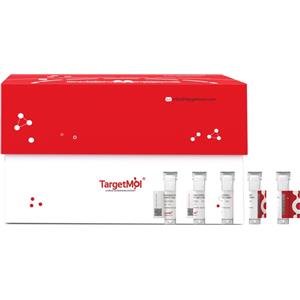
Glucokinase Protein, Human, Recombinant NEW
| Price | $498 |
| Package | 50μg |
| Min. Order: | |
| Supply Ability: | 10g |
| Update Time: | 2025-07-16 |
Product Details
| Product Name: Glucokinase Protein, Human, Recombinant | Supply Ability: 10g |
| Release date: 2025/07/16 |
Product Introduction
Bioactivity
| Name | Glucokinase Protein, Human, Recombinant |
| Description | Glucokinase belongs to the bacterial glucokinase family. Hexokinases phosphorylate glucose to produce glucose-6-phosphate, the first step in most glucose metabolism pathways. Alternative splicing of this gene results in three tissue-specific forms of glucokinase, one found in pancreatic islet beta cells and two found in liver. The protein localizes to the outer membrane of mitochondria. In contrast to other forms of hexokinase, this enzyme is not inhibited by its product glucose-6-phosphate but remains active while glucose is abundant. Mutations in this gene have been associated with non-insulin dependent diabetes mellitus (NIDDM), maturity onset diabetes of the young, type 2 (MODY2) and persistent hyperinsulinemic hypoglycemia of infancy (PHHI). It can Catalyzes the initial step in utilization of glucose by the beta-cell and liver at physiological glucose concentration. Glucokinase has a high Km for glucose, and so it is effective only when glucose is abundant. The role of GCK is to provide G6P for the synthesis of glycogen. Pancreatic glucokinase plays an important role in modulating insulin secretion. Hepatic glucokinase helps to facilitate the uptake and conversion of glucose by acting as an insulin-sensitive determinant of hepatic glucose usage. It has a pivotal role as glucose sensor of the pancreatic beta-cells. Glucokinase explains the capacity, hexose specificity, affinities, sigmoidicity, and anomeric preference of pancreatic islet glycolysis, and because stimulation of glucose metabolism is a prerequisite of glucose stimulation of insulin release, glucokinase also explains many characteristics of this beta-cell function. Glucokinase of the beta-cell is induced or activated by glucose in contrast to liver glucokinase, which is regulated by insulin. Tissue-specific regulation corresponds with observations that liver and pancreatic beta-cell glucokinase are structurally distinct. Glucokinase could play a glucose-sensor role in hepatocytes as well, and certain forms of diabetes mellitus might be due to glucokinase deficiencies in pancreatic beta-cells, hepatocytes, or both. |
| Storage | store at low temperature | Shipping with blue ice/Shipping at ambient temperature. |
| Keywords | MODY-2 | MODY 2 | HK-4 | HK 4 | HHF-3 | HHF 3 | hexokinase 4 | glucokinase | FGQTL-3 | FGQTL 3 |
Company Profile Introduction
Target Molecule Corp. (TargetMol) is a global high-tech enterprise, headquartered in Boston, MA, specializing in chemical and biological research product and service to meet the research needs of global customers.
TargetMol has evolved into one of the biggest global compound library and small molecule suppliers and a customer based on 40+ countries. TargetMol offers over 80 types of compound libraries and a wide range of high-quality research chemicals including inhibitors, activator, natural compounds, peptides, inhibitory antibodies, and novel life-science kits, for laboratory and scientific use. Besides, virtual screening service is also available for customers who would like to conduct the computer-aided drug discovery.
You may like
Recommended supplier
| Product name | Price | Suppliers | Update time | |
|---|---|---|---|---|
| $462.00/50μg |
VIP5Y
|
TargetMol Chemicals Inc.
|
2025-04-29 | |
| $70.00/1kg |
VIP3Y
|
Zibo Hangyu Biotechnology Development Co., Ltd
|
2023-11-27 |
- Since: 2011-01-07
- Address: 36 Washington Street, Wellesley Hill, USA
INQUIRY



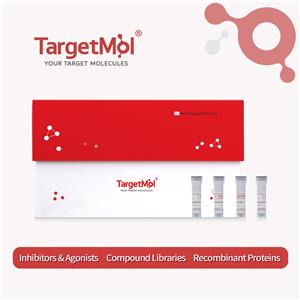
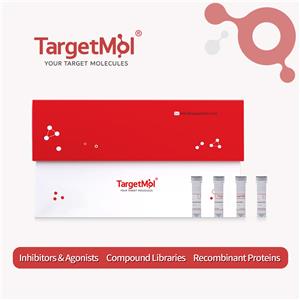
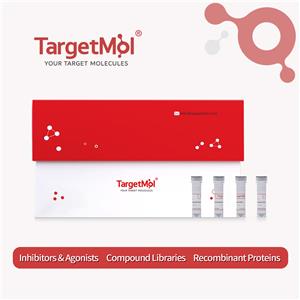
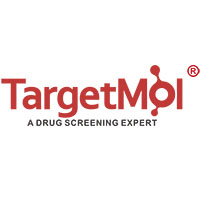
 United States
United States